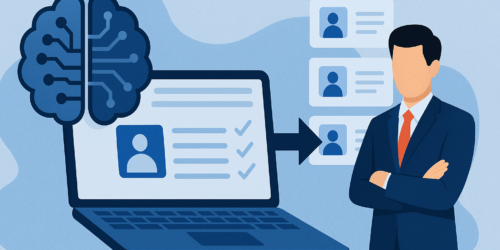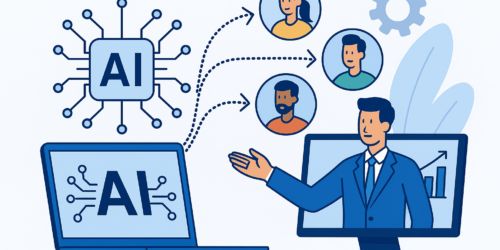What's in this article?
The integration of artificial intelligence (AI) into lead management systems has immense potential to revolutionize sales processes. By automating repetitive tasks, enhancing lead scoring, and providing insightful data, AI systems offer unique capabilities that can transform business operations. Nevertheless, the path to successful AI integration is punctuated with challenges. Understanding these obstacles, and how to overcome them, is essential for businesses keen on leveraging AI to its fullest potential.
Understanding AI Integration Challenges
Data Quality and Integration
One of the most significant hurdles in integrating AI into lead management systems is ensuring high-quality data. AI relies on vast amounts of data to function effectively, but data scattered across various platforms can lead to discrepancies and inefficiencies. Ensuring seamless integration requires consolidating data from diverse sources while maintaining strict compliance and security measures.
To enhance data quality and integration, businesses should invest in robust data management systems that can operate at scale, ensuring data is both accurate and accessible. Employing advanced data cleaning and processing tools will further ensure that AI systems receive the most reliable information, enhancing their learning and decision-making capabilities.
User Adoption and Cultural Shifts
Another challenge is driving user adoption. AI systems often trigger concerns about job displacement or complexity among employees. There exists a need to shift organizational culture towards viewing AI as an ally rather than a threat. Positioning AI as a tool that complements human effort, enabling employees to focus on higher-value tasks, is crucial.
Organizations can foster a culture of innovation by offering training programs that illuminate how AI can benefit employees and the company overall. By integrating AI education into professional development initiatives, employees can become champions of the technology, driving adoption through firsthand experience with its benefits.
Solutions for Seamless AI Integration
Technology and Infrastructure
Successful AI integration hinges upon robust technology and infrastructure. Organizations must ensure they have the necessary computational resources and scalable IT infrastructure to support AI activities. This includes access to extensive training datasets and the implementation of compatible CRM systems that streamline AI operations.
Organizations seeking to integrate AI should evaluate their existing technical frameworks to identify any potential bottlenecks. By ensuring their infrastructure is primed for AI, companies can better handle the computational loads and data requirements of AI systems.
Change Management
Effective change management is vital for promoting AI adoption within an organization. It involves strategically planning the transition to AI systems, addressing potential resistance, and promoting a smooth cultural and operational shift. Implementing comprehensive training programs that emphasize the practical benefits of AI can greatly facilitate this process.
Leadership should engage transparently with teams regarding the changes AI brings and continuously solicit feedback to address concerns. Building a collaborative approach that involves all stakeholders will foster a supportive environment conducive to successful AI integration.
Benefits of AI-Powered Lead Management
Enhanced Lead Scoring and Assignment
AI revolutionizes lead scoring and assignment processes by leveraging algorithms that analyze past data and predict outcomes with high accuracy. This predictive capability means that sales teams can focus their efforts on leads with the highest probability of conversion, optimizing resource allocation and improving sales effectiveness.
By adopting AI-driven lead management solutions, companies can experience a notable increase in conversion rates. Leveraging predictive analytics allows for more efficient and strategic sales operations, which can be a game-changer in competitive markets.
Future Trends and Opportunities
As AI technology continues to advance, emerging trends such as real-time optimization and dynamic territory management are set to redefine lead management. Companies that remain adaptable and invest in keeping their AI tools updated stand to gain significantly, maintaining a competitive edge through cutting-edge lead management strategies.
A Logical Next Step: Explore AI Integration
If your business is poised to integrate AI into its lead management systems, consider partnering with ProPair. Our solutions are designed to seamlessly blend with your existing operations, driving efficiency and enhancing lead handling. Experience AI’s impact—schedule a demo today.
FAQ
What are the common challenges in AI integration for lead management?
AI integration often faces challenges related to data quality, system compatibility, user adoption, and cultural shifts within organizations.
How does AI improve lead scoring?
AI enhances lead scoring by utilizing algorithms to analyze historical data, predicting the likelihood of conversion with greater accuracy than traditional methods.
What role does change management play in AI integration?
Change management is crucial as it addresses both the operational and cultural shifts needed for AI adoption, helping employees transition smoothly to new systems.
How can companies ensure data quality for AI?
Investing in robust data management systems and employing advanced data cleaning tools can help ensure the accuracy and reliability of data used by AI systems.
What are the future opportunities for AI in lead management?
Trends like real-time optimization and dynamic territory management promise to further enhance lead management, offering companies new avenues for efficiency and success.



